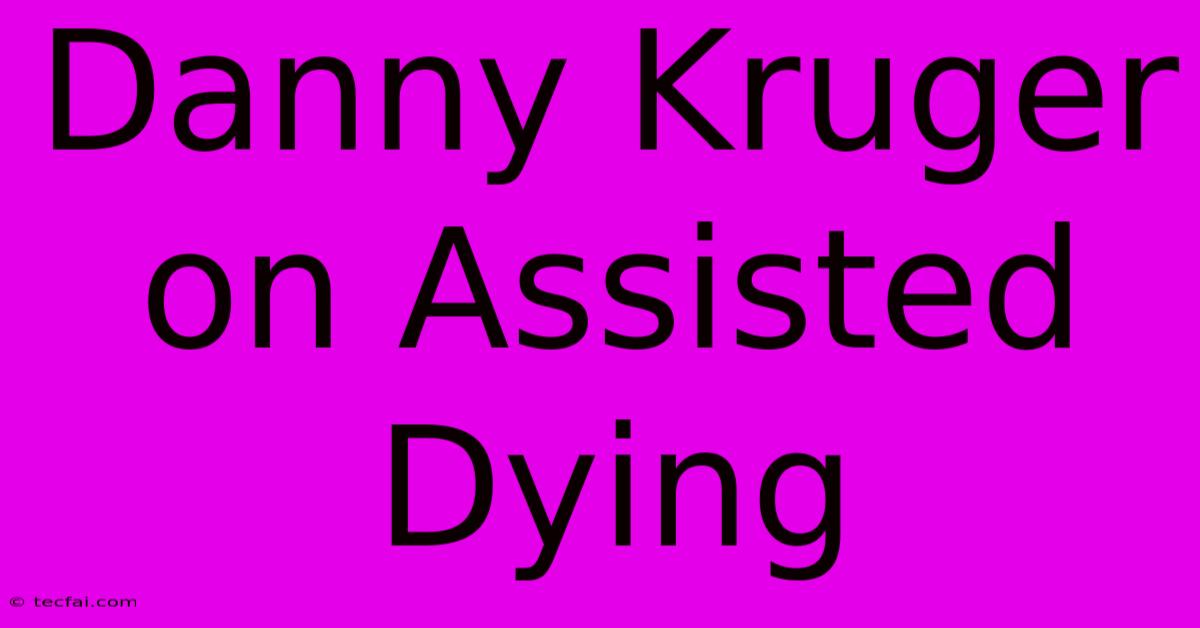Danny Kruger On Assisted Dying

Discover more detailed and exciting information on our website. Click the link below to start your adventure: Visit Best Website tecfai.com. Don't miss out!
Table of Contents
Danny Kruger MP and the Complex Issue of Assisted Dying
Conservative MP Danny Kruger has consistently positioned himself as a vocal opponent of assisted dying legislation in the UK. His stance, rooted in deeply held ethical and moral convictions, has placed him at the forefront of this often divisive debate. This article will explore Kruger's arguments against assisted dying, examining the context of his views and the broader implications of this complex issue.
Kruger's Core Arguments Against Assisted Dying
Kruger's opposition to assisted dying stems from several key concerns. He frequently emphasizes the vulnerability of the elderly and disabled, arguing that legalizing assisted dying could inadvertently pressure vulnerable individuals into ending their lives, even if they don't genuinely desire it. This concern highlights a potential for coercion, where societal or familial pressures could outweigh an individual's true wishes.
He also raises concerns about the potential for abuse and error within the system. Kruger points to the difficulties in definitively establishing someone's capacity to make such a life-altering decision, especially in cases involving dementia or other cognitive impairments. The potential for misdiagnosis or coercion could lead to irreversible consequences, a risk he believes outweighs the potential benefits.
Furthermore, Kruger often highlights the importance of palliative care. He believes that improving access to high-quality palliative care, which focuses on pain management and emotional support, is a more effective and ethical approach to addressing end-of-life suffering. Investing in palliative care, he argues, addresses the underlying issue of pain and suffering rather than addressing the symptom by ending life.
The Broader Context of the Assisted Dying Debate
Kruger's views are part of a much larger and ongoing debate in the UK. Proponents of assisted dying legislation argue that individuals should have the right to choose how and when they die, particularly in cases of unbearable suffering. They emphasize the importance of autonomy and self-determination in end-of-life decisions.
The debate is fraught with ethical, moral, and practical considerations. Questions surrounding safeguards, the definition of "unbearable suffering," and the potential for unintended consequences are at the heart of this complex discussion. Finding a balance between respecting individual autonomy and protecting vulnerable populations is a significant challenge.
The Role of Compassion and Palliative Care
A crucial aspect of Kruger's argument centers on the role of compassion and the importance of providing comprehensive palliative care. He advocates for a society that prioritizes supporting individuals through their final stages of life, providing comfort and care rather than offering assisted suicide as a solution. This approach emphasizes the value of human life and the importance of holistic care.
Conclusion: A Continuing Debate
Danny Kruger's position on assisted dying reflects a deeply held belief in the sanctity of life and the need to protect vulnerable individuals. While his views are not universally shared, they represent a significant voice in a complex and emotionally charged debate. The discussion continues, with advocates on both sides presenting compelling arguments about individual rights, societal protection, and the best way to approach end-of-life care. Understanding all perspectives is crucial to navigating this sensitive issue and fostering a compassionate society.

Thank you for visiting our website wich cover about Danny Kruger On Assisted Dying. We hope the information provided has been useful to you. Feel free to contact us if you have any questions or need further assistance. See you next time and dont miss to bookmark.
Featured Posts
-
Dicks Injury Raptors Give Update
Nov 26, 2024
-
World Chess Ding Stuns Gukesh
Nov 26, 2024
-
Cavs Panalo Raptors Natalo Sa Cleveland
Nov 26, 2024
-
Microsoft Global Outage What We Know
Nov 26, 2024
-
Watch Celtics Vs Clippers Tonight
Nov 26, 2024
